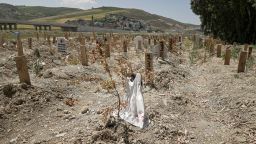Bedi De?irmenci has taken his first breaths of fresh air since?a monster earthquake?struck southeast Turkey three months ago.
For three days,?the 36-year-old lay trapped under the rubble of his home in Hatay. Then he was hospitalized for traumas to the head and spine, and discharged only on Wednesday, just days before the country’s historic?May 14 presidential and parliamentary elections.
Deep gashes frame the right side of Bedi’s face and he now walks with a permanent limp. When he reunites with the few relatives who survived the quake, the air fills with a crescendo of sobs — the grief of bereavement infused with relief over Bedi’s recovery.?
The earthquake killed Bedi’s wife, his parents-in-law, his two daughters and their cousin.?The children were 4, 5 and 6 years old. Two other children from the wider family also lost their lives.
Bedi's family and extended family were decimated by Turkey's devastating earthquake on February 6.
Lorenz Huber/CNN
For his tragedy, Bedi blames the government and President Recep Tayyip Erdogan, who is battling for a third term, buffeted by economic headwinds and criticism that the impact of the February 6 earthquake was made worse by lax building controls and a shambolic rescue effort.??
The earthquake claimed more than 50,000 lives in Turkey and neighboring Syria, and displaced more than 6 million people. The state’s emergency workers were all but absent in many parts of the disaster area during the first few days that followed.?
For three days, Bedi’s relative —Caner De?irmenci — sledgehammered a path to the destroyed family home in Hatay. Just over 72 hours later, he and the Italian rescue team, Vigili del Fuoco, rescued Bedi and recovered the lifeless bodies of his wife and two daughters.??
“For the first 48 hours under the rubble, my daughter Talya was alive. We were talking together constantly,” says Bedi. “Then suddenly, she stopped speaking.????
“What happened was not a disaster. It was murder.”??
The day after the earthquake, Erdogan berated critics of the government’s botched earthquake response. Days later, the government admitted that the rescue effort had fallen short and issued a public apology.
Criticism of the government soon became dominated by the issue of building standards, which have been relaxed since Erdogan and the ruling Justice and Development (AK) Party took power. In the weeks after the quake, the government rounded up dozens of contractors, construction inspectors and project managers for violating construction rules.
Critics dismissed the arrests as scapegoating. Relaxed building regulations were at the heart of the construction boom that turbocharged Erdogan’s 20-year rule, they argued, and the aftermath of the earthquake serves as an indictment of the country’s strongman leader.
Yet in the Erdogan strongholds that pepper the earthquake zone of southeast Turkey, those criticisms may have largely fallen on deaf ears.
“This is the most tense moment I have seen in Turkish society,” said Asli Ayd?nta?ba?, a visiting fellow at the Brookings Institution.?”(The elections) are going to be about the future direction of the country and two radically different visions of where Turkey will go. And the opposition is galvanized.”??
For Ayd?nta?ba?, the earthquake may have entrenched those deep divisions. Opposition-leaning communities are angrier than ever at Erdogan, while his support base has embraced the ruling party’s main talking point: mistakes were made at the beginning and now only Erdogan can rebuild what was destroyed.?
“More than anything else, the earthquake consolidates the two sides,” said Ayd?nta?ba?.??
Read the full story:





























